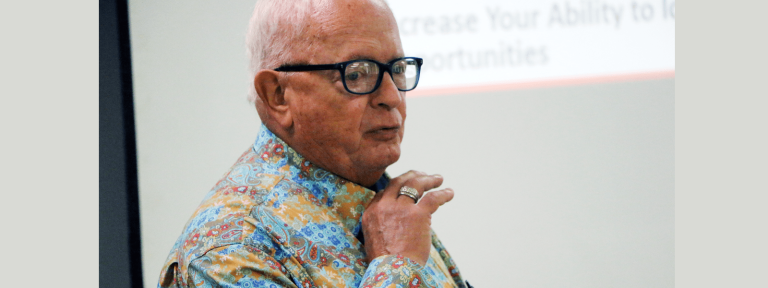
“Engineers have an important role to play in policy development. I think engineers have many qualities to bring to the policy arena but their disciplined thinking and quantitative reasoning skills are the most important.”
Dr. Jim Gover, Professor Emeritus at Kettering University, understands the importance of engineering in any career, but he also understands the importance of engineers being well rounded and speaking up to make a difference.
Gover, who has a bachelor's and master's degree in Electrical Engineering and a Ph.D. in Nuclear Engineering, spoke to students at Kettering in September about his work on public policy related to industrial competitiveness and vehicle policy in hopes of getting students more interested in policy.
Gover posed the question, “Are engineers problem solvers or are engineers just technical problem solvers?”
“True problem solving involves many dimensions. The technical, economic, political and social dimensions,” Gover said. “A lot of times engineers focus solely on the technical dimension. If you’re going to be effective in problem solving, you need to address all dimensions.
“For example, the U.S. nuclear weapons program has been a technical and political success, but it is costing $332 billion and taking 55 years to clean-up its environmental contamination.”
He spoke about his book “Confessions of a Policy Wonk: Lessons for Federal R&D Policy & Professional Society Policy Efforts.” In it, he walks through his 10 years (three working for Congress as an IEEE-USA Congressional Fellow and Competitiveness Fellow) of experience as an electrical and nuclear engineer working full time on national science and technology policy issues. His treatise lists over 20 lessons he learned – some the hard way - about the intersection between science, technology and politics.
Throughout these efforts he was an active member of several IEEE-USA policy committees and often updated these committees with presentations on his policy research and publications. IEEE-USA awarded Gover its Citation of Honor for his policy work.
“In this country, there are many problems addressable only by public policy. These often exhibit complex systems behavior while evolving along nonlinear paths and adapting to emerging circumstances,” Gover said. “Most policy is made in an information deficient environment. People developing and implementing policy rarely have enough information to do their job well. That is why so many policy decisions by the President and Congress often have unintended consequences and the costs of government regulations often exceed benefits.”
Gover believes engineers can use their logic and modeling skills to play an important role in developing models of complex public policy problems and help guide the policy development process. However, they must go outside of the box and their complex systems models must address all dimensions of problems, he said.
Gover had three careers that took him to many different places and led to many opportunities. He spent 25 years in nuclear weapons development at Sandia National Laboratories, 10 years in national policy research and 13 years at Kettering University as a member of the Electrical and Computer Engineering faculty. Gover came to Kettering University in 1998 and became Professor Emeritus five years ago.
Much of his technical work was studying the effects of nuclear radiation countermeasures on the electronics used in nuclear warheads. IEEE awarded him the title of Fellow for this work.
Highlights of Gover’s policy work include co-writing the House Science Committee Report “Technology and Its Impact on the National Economy,” co-writing the Senator Roth Competitiveness Bill, and co-writing the Sandia Report “Rational Solutions for Challenges of the New Millennium which is available on-line. He continues to write policy-related op-eds for the Albuquerque Journal.
“Engineers have an important role to play in policy development. For many of them it may initially be an unnatural role,” said Gover, wanting to challenge Kettering students and graduates. “I think engineers have many qualities to bring to the policy arena but their disciplined thinking and quantitative reasoning skills are the most important.”
Examples of public policy for vehicles that students could get involved in include federal and state rebates for PEV purchases, federal and state gasoline taxes, carbon tax, emission controls and safety laws for seat belts, airbags and anti-lock brakes.
Gover also encourages students and engineers to affect policy by writing newspaper articles and journal articles in which they really research all dimensions of an issue.
“I think students need to learn a lot about issues out there today. It’s work, but it’s worth it,” Gover said.
There’s more to engineering than the technical thinking, Gover said. Engineers, Kettering students and graduates, have an opportunity to make an impact beyond their engineering work, he said.
“I hope we will see the day where we see more members of Congress with an engineering or science background and they would use that background for much more rigorous policy making,” Gover said. “Working for Congress completely changed my perspective on how the world works. It mellowed it. It would have been more useful if I would have done that earlier in my career.”